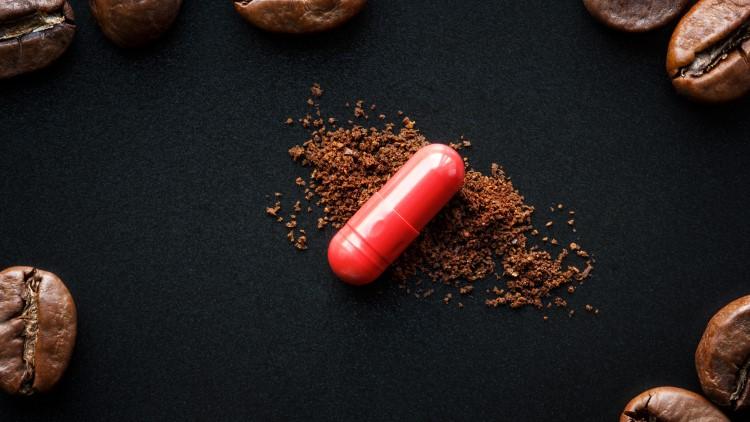
What is Caffeine Anhydrous and Can These Caffeine Pills help you Lose Weight?
- Introduction
- How Caffeine works
- What is caffeine anhydrous?
- Caffeine Benefits
- Side effects of caffeine
- Signs of caffeine overdose
- Who should limit or avoid caffeine anhydrous?
- How to use caffeine anhydrous for weight loss or to improve athletic performance
Introduction
What is caffeine anhydrous? Can it really help users to lose weight or is this another misplaced claim?
We explore this nervous system stimulant – in all of its various forms’ e.g. powder, drink and pill – to see if it can really make a difference to your weight loss endeavors.
How Caffeine works

Like we mentioned above, caffeine is a nervous system stimulant that is reputed to eliminate drowsiness and bolster your energy levels, so you have got the focus to tackle the day ahead.
In fact, according the US Food and Drug Administration, just 1 teaspoon of caffeine powder is the same as drinking 28 cups of coffee. Obviously, drinking that much coffee is dangerous; however, it shows just how potent caffeine powder is.
The Science
When you consume caffeine, it enters your brain via your bloodstream, whereupon it mimics adenosine (a naturally occurring compound in your body).
Now, whilst adenosine acts like a depressant causing you to slow down and feel sleepy; when caffeine impersonates adenosine – by attaching itself to certain receptors in your brain and limiting adenosine binding – not only does it mimic it so effectively that it takes adenosines place (as it is structural similar), it also causes the opposite reaction. Meaning, instead of making you feel tired, caffeine helps to awaken and rejuvenate your brain, whilst making you more alert.
But that is not all it can do…
Caffeine anhydrous can also help to boost the effects of other natural stimulants, including dopamine, norepinephrine, glutamate and adrenaline.
NOTE: Caffeine works no matter whether you have it from its natural source or as caffeine anhydrous. Either way, you’ll begin feeling the effects of caffeine within an hour and it will wear off after 3-4 hours.
What is caffeine anhydrous?
Would you believe that caffeine is a naturally occurring substance that can be found in roughly 60 different plant species? It’s true! Yet of those 60 plants, you are probably most familiar with coffee beans, tea leaves (green tea) and cacao.
Caffeine anhydrous vs caffeine – what is the difference?
They make look different, but chemically they are the same.
Take for example caffeine anhydrous. It is derived from the seeds and leaves of coffee plants. However, unlike traditional coffee (cacao and coffee beans) which is rarely altered; caffeine anhydrous differs because all of its water – and other chemical components – have been completely filtered out; leaving behind a white crystalline powder.
In other words, caffeine anhydrous is a processed, dehydrated form of concentrated coffee that is easily added to gum, drinks and energy bars to help boost energy, weight loss and physical performance.
Caffeine anhydrous:
Pros – it can provide you with a more standard dose compared to drinking traditional coffee/tea; it is easier to carry around as it can be taken in the form of pills, gums and gels, and it can improve your athletic performance
Cons – pure caffeine powder is more potent, increasing the risk of overdose/intoxication. Even the smallest error in measurement can result in potentially fatal consequences (yep you guessed it – death).
What types do you need to look out for?
- Caffeine pills – these come in two forms – as weight loss supplements (designed to increase fat burn) and as athletic enhancers. In both cases they can increase feelings of alertness and energy.
- Caffeine anhydrous powder – caffeine powder may be the most common form of caffeine anhydrous; however, the FDA advises against using pure powders due to the dangers they pose. There is a very fine line between what is safe and unsafe, and unfortunately, unsafe dosages can exponentially increase your rise of caffeine anhydrous side effects.
- Any other caffeine forms – caffeine powder is often put into food products such as gums and energy bars to help boost energy and stimulate increased weight loss. It can also be found in pre-workout powders.
Things to remember: When caffeine anhydrous is used in a supplement, it isn’t always labeled as ‘caffeine anhydrous’. Instead, due to it being combined with other chemicals it is often also named:
- Decaffeinate malate – this consists of 2 caffeine molecules attached to malic acid. Combined manufacturers believe (although it has never been proven) it can prevent stomach upsets.
- Caffeine citrate – a combination of caffeine anhydrous and citric acid monohydrate and sodium citrate dehydrate; caffeine citrate is regularly used to medicinally treat breathing problems in premature children.
- Caffeine pterostilbene co-crystal – a combination of caffeine and pterostilbene, it can be taken in as a capsule, tablet or a chew, and supposedly can give you longer lasting energy (there are NO scientific studies to prove this claim).
Caffeine Benefits
Before we can effectively highlight all of caffeine’s benefits, it is important that you fully understand the difference between what caffeine has got to offer and caffeine anhydrous.
After all, if plain old coffee could offer you the same athletic performance enhancements as caffeine anhydrous, you’d pick just coffee right? Especially as it is the safer option.
Here are two pieces of research to help you decide – once and for all – where you stand on the caffeine anhydrous vs caffeine debate:
Study One: during a study on elite male cyclists, researchers saw no difference in performance-enhancing effects of 5mg/kg coffee whether it was from coffee or caffeine anhydrous.
Study Two: a review published in the International Journal of Sports Nutrition and Exercise Metabolism concluded that there was moderate evidence which supported the claim that coffee CAN act as an ergogenic aid for boosting running and cycling performance.
Looking at these studies, what quickly becomes apparent is that coffee is just as good as caffeine anhydrous at kick-starting your workouts (if you drink it 1 hour before exercise). In fact, research suggests 3-6mg/kg of caffeine (of body weight) is enough to bolster your physical performance e.g. so if you weighed 150lbs, you’d need 200mg of caffeine/2 cups of coffee.
But what other benefits can caffeine pills offer?
- Exercise performance – numerous studies and reviews have concluded that caffeine (natural or otherwise) can enhance your endurance levels and physical performance whilst running or cycling. A meta-analysis published in the Journal of the International Society of Sports Nutrition noted that caffeine is able to improve certain muscular strength and power measurements in participants.Admittedly, there doesn’t appear to be a standard approach to administering caffeine – when it comes to exercise – however, most athletes seem to opt for caffeine pills as it is easier to control the dose (compared to drinking it) and keep your body safe.
- Reduces fatigue – as a central nervous stimulant, caffeine can help you to feel more alert and less tired.
- Improves concentration.
- Increased weight loss – by boosting your metabolism and stimulating increased fat burn (we’ll explain the science behind this later); in the short term, it can help you to burn more calories and lose weight.
- It is effective at relieving tension headaches (especially when it is combined with ibuprofen).
- Prevents/slows down cell damage – this is thanks to caffeine being rich in certain antioxidants.
- May offer protection from heart disease and diabetes – more research is needed to verify this one.
- Gallstones – supposedly coffee drinkers tend to have fewer gallstones.
- May offer men a measure of protection against Parkinson’s disease.
NOTE: NCAA (National Collegiate Athletic Association) have put restrictions on caffeine consumption with a threshold of 15mg per ml of urine (or to put it simply 500mg/6 cups of coffee).
Side effects of caffeine
This is a tricky one as it depends on how you are taking it.
For instance, the FDA Trusted Source strongly advises against the use of caffeine powder as it has been linked to the deaths of at least two young men (due to caffeine intoxication/overdose). However, when it comes to drinking coffee, it is safe to drink 400mg of coffee a day (4-5 cups). Similarly, you should have no more than 200mg in a single dose.
But what about caffeine anhydrous side effects? Are they serious? To date it has been linked to:
Increased risk of sudden cardiac death (as it can trigger erratic heartbeats).
Frequent urination – as a diuretic, caffeine can potentially cause dehydration if you don’t drink plenty of water or if you’re strenuously exercising.
Calcium loss – over time caffeine can trigger falls in calcium leading to issues with bone density and osteoporosis.
- Increased anxiety, nervousness, and insomnia.
- Headaches
- Restlessness
- Nausea or lack of appetite.
- Diarrhea
- Heightened cholesterol levels (due to the chemicals found in coffee).
NOTE: Whilst caffeine hasn’t been banned by the WADA for use in performance enhancement; it is still on their monitoring program. This means it is under constant supervision because of the danger of it being misused/abused by athletes.
Signs of caffeine overdose
The biggest worry with caffeine is the risk of overdose/intoxication –, especially with pure caffeine anhydrous powder. Even the smallest amount over the recommended dosage could lead to an array of dangerous side effects – some of which could prove fatal!
That is why it is important that you keep a look out for the following signs – and seek medical attention – just in case you accidentally take too much:
- Chest pain and rapid/erratic heartbeat
- Vomiting
- Diarrhea
- Abdominal pain
- Disorientation and confusion
- Agitation
- Muscle tremors/twitching
- Seizures
- Death
Like we’ve said before, the risk of toxicity is higher if you use caffeine anhydrous due to the potency of its powder. This means, if you ingest caffeine through foods or beverages, you are less likely to suffer from these severe side effects (as long as you have them in moderation).
Yet caffeine anhydrous side effects and intoxication are not the only things you need to worry about…
In all forms, caffeine is addictive and can lead to the following withdrawal symptoms if you stop: headaches, fatigue, and irritability. To avoid this, we recommend decreasing the amount of caffeine you have (gradually), as this will help to minimize withdrawal symptoms.
Who should limit or avoid caffeine anhydrous?
Whilst basic coffee is okay to take (to a certain degree); highly concentrated forms of caffeine – in powders and liquids – can prove quite problematic.
For instance, caffeine anhydrous is especially dangerous (at the wrong dosage), as 1 teaspoon alone is the equivalent of 28 cups of coffee. 28!
Therefore, you should be careful about how much you take if you fall into any of the following categories:
- Pregnant – you should have no more than 200mg a day, as higher dosages may increase the risk of miscarriage and impaired fetal growth.
- Breastfeeding – similar to pregnancy, you should have no more than 200mg a day, as newborns and premature babies are incredibly sensitive to the effects of caffeine (makes them restless and irritable).
- Teenagers/children – the risk here comes from energy drink manufacturers who sell these drinks as a means to improving concentration, energy levels, and athletic performance. Children do not need to consume caffeine and it should be avoided if possible. The most children should have is 23mg (one can of Coke) a day. Teenagers are advised to keep to similar guidelines.
- Anyone on medication – caffeine anhydrous may potentially interact with certain medications and herbal supplements. For this reason, speak to your doctor – before taking a caffeine pill – to make sure it is safe.
- Some mental disorders – caffeine can sometimes make your symptoms worse if you suffer from a generalized anxiety disorder or panic disorder.
- Certain conditions – if you’ve got heart or liver disease, or diabetes, you should speak to your doctor before you consider using it.
How to use caffeine anhydrous for weight loss or to improve athletic performance
We’ve mentioned a few times during this article how caffeine can help to boost weight loss and your physical performance. But how does it work?
Caffeine and weight loss
- Increase metabolism – the rate at which you burn calories is your resting metabolic rate (RMR). Caffeine can help to raise your RMR by 3-11%, helping to increase your weight loss (when combined with exercise and a healthy diet).
- Boost fat burn – caffeine can help to stimulate your nervous system by increasing the presence of epinephrine in your bloodstream (as well as increasing heat production). This results in signals being sent directly to your fat cells, telling them to break down fat and release them into your blood. Now at this point, if you do nothing, you won’t lose weight. However, if you endeavor to burn more calories than you consume, then this can result in fat loss. In fact, early research suggests taking caffeine before you exercise can release 30% more stored fat.
NOTE: caffeine can produce greater fat burning results the leaner you are. One study revealed that it helped to increase fat burn by 29% in lean people, but by only 10% in obese people. - Appetite – during one study exploring caffeine’s appetite reducing effects (on men), caffeine enabled them to eat less during meals. This is only one study though. In a separate study, caffeine was found to have no effect on their appetite.
NOTE: the one downside is that with time you can become tolerant to caffeine. This means, whilst caffeine can help you to lose weight initially; eventually, you’ll become immune to its effects and it will stop working. For that reason, we recommend cycling caffeine (2 weeks on and 2 weeks off) to prevent this tolerance from taking hold.
Caffeine and physical/athletic performance
- Energy – by blocking adenosine (an inhibitory neurotransmitter), caffeine can help increase the number of firing neurons, whilst also releasing dopamine and norepinephrine. Together they help you to feel energized, awake and ready to perform.
- Endurance – linking to the point above, this increased energy can help you to stay more active (even when you’d normally feel tired). In doing so, it can increase your physical performance by 11-12%. During a separate study where athletes were given 9.8mg of caffeine, it helped to boost their endurance levels. They were able to run 1.3-2 miles more than those on the placebo.
- Focus – caffeine works by activating areas of your brain and nervous system, resulting in improved focus and energy. With greater focus, you will find the drive to keeping pushing further and harder (both physically and mentally).
- Hormones – caffeine influences epinephrine (adrenaline) which is responsible for your fight or flight response, enabling you to raise your performance.
- Muscles – caffeine can influence your motor cortex (a part of the brain which signals muscle activation).
- Mind – one study discovered that coffee can reduce the perception of effort. This enabled participations to work harder and go for longer.
- Accuracy – caffeine pills have been linked to improved accuracy in the following sports: rugby, 500m rowing, and soccer sprints.
- Strength – studies are split on this one, as in some cases caffeine helped to improve leg muscles by 7%, whilst in others, it had no impact on smaller muscle groups. That being said, there is some evidence which suggests caffeine can improve your muscular endurance (enabling you to do more repetitions at set weights).
NOTE: studies have noted that caffeine can have more performance-enhancing effects on trained athletes than on those who exercise only recreationally or are new to exercise. Two separate studies on ‘recreationally active men’ doing bike sprints saw no difference in results between those given caffeine and those who just drank water.
How can you supplement with caffeine to produce weight loss and improved physical performance?
The amount of caffeine you can have will partially depend on your body weight. Usually, dosages are based on 1.4-2.7mg per lb of body weight. This means on average you would be allowed to have 200-400mg of caffeine a day.
That being said, you should NEVER have more than 400mg a day because of the risk of intoxication.
Instead, aim to start off small with just 150-200mg of caffeine a day (consumed 60 minutes before you exercise) and then assess your tolerance/reaction to it. Only increase if you experience no negative side effects.
Conclusion
On the outside caffeine looks like the perfect solution for boosting weight loss. With studies pointing towards its ability to increase fat burn, energy, and metabolism; this combination could potentially help you to shift those excess lbs (when combined with healthy eating and exercise).
But here is the thing…
Despite its clear benefits, caffeine anhydrous comes with a lot of cons. From risk of intoxication and severe side effects, to the fine line between safe dosages and dangerous ones (especially with pure caffeine powder), to its short term gains (all too soon you will become tolerant to its effects); add all of this together and is it really worth the short term losses in fat? Not really. Not when there are safer options.
For that reason, we recommend sticking to natural supplements such as PhenQ, as their ingredients have been purposefully chosen for their ability to burn stored fat; suppress your appetite, and block fat production. More importantly, it is free of any negative side effects.
For more information click here




